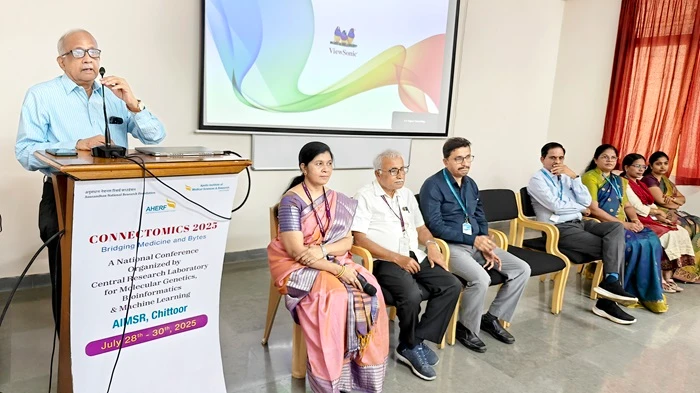The Art of Research Workshop at The Apollo University

The pursuit of research is often described as a journey—an expedition into the realm of curiosity, questioning, and discovery. It is a path that transforms learners into explorers and transforms mere ideas into knowledge that can touch lives. With this spirit, the Department of Psychology, The Apollo University, in collaboration with the Institutional Ethics Committee, Apollo Institute of Medical Sciences & Research, hosted a two-day workshop on “The Art of Research” on 13th and 14th August 2025 at the Medical Education Unit, Admin Block.
The workshop was conceived as a crucible of ideas—a space where young minds and seasoned scholars could come together to unravel the intricate craft of research design and ethical inquiry.
The programme began with an inaugural ceremony on the morning of 13th August, radiating an atmosphere of anticipation. Dr. H. Vinod Bhat, Vice Chancellor, The Apollo University, graced the occasion as the Chief Guest, while Dr. M. Potharaju, Head, Department of Psychology, and the Registrar, TAU, joined as Guests of Honour.
In his address, Dr. Bhat eloquently painted research not as a mere academic requirement, but as a culture—a way of life that thrives across the campus. He emphasized how inquiry should begin early, nurturing students to become creators of knowledge rather than passive consumers. Citing instances of TAU students whose projects had already attracted prestigious grants, he underscored that “research is not about arriving at answers alone, but about asking the right questions with precision and purpose.”
He spoke passionately about the architecture of good research—where methodology acts as the bridge between curiosity and clarity. Any gap in this bridge, he reminded the audience, can lead to conclusions without conviction. His words resonated deeply, setting the tone for the workshop’s central message: that research is both an art and a discipline.
Dr. Bhat also acknowledged the Institutional Ethics Committee’s recognition by the government, and announced the establishment of a Scientific Committee, envisioned as a nurturing ground where students can experience research in its full rigor, guided by ethics and innovation.
The workshop had wall-hanging sessions, each carefully designed to illuminate a vital dimension of research. The distinguished resource persons, drawn from the IEC, brought their expertise and insights to the participants from AIMSR:
- Dr. Sachidananda Adiga M.N., Professor & Head, Pharmacology
- Dr. Vijetha P., Professor, Physiology
- Dr. Devika P.J., Associate Professor, Community Medicine
- Dr. Jayapriya T., Associate Professor, Psychiatry
The sessions traversed through the landscape of research methodology, guiding participants on how to review literature like seekers of hidden gems, shape research questions with clarity, and frame hypotheses with both logic and imagination. The art of defining objectives, choosing designs, selecting participants, and crafting research tools was explained with a rare blend of technical detail and intellectual inspiration.
Complex concepts such as sample size calculation, statistical validity, and sampling techniques were made approachable, enabling participants to see them not as rigid formulas but as instruments of precision that add strength to the wings of inquiry.
Above all, the discussions on research ethics shone as the moral compass of the workshop. Through explorations of informed consent, privacy, confidentiality, and respect for participants, the sessions reminded everyone that research, however groundbreaking, must remain humane at its core. Ethical approval, therefore, is not a bureaucratic hurdle but a sacred commitment to dignity and integrity.
The sessions were deeply interactive, with students and faculty engaging in dialogues that mirrored the very spirit of research—a conversation between the known and the unknown. Questions flowed, doubts were dissected, and clarity emerged through shared learning. Each discussion became a stepping stone, building participants’ confidence to walk the path of research with both conviction and creativity. Dr. Bhaskar Naidu S., Professor and Programme Coordinator, extended his guidance as an advisor, lending valuable insights that shaped the success of the event. Dr. S. Haseena, Assistant Professor and Programme Coordinator, undertook the key responsibilities of organizing and coordinating the sessions with dedication and precision. Participants expressed their gratitude for the wisdom imparted, while the organizers acknowledged the contributions of the resource persons whose guidance had transformed abstract concepts into lived experiences.
